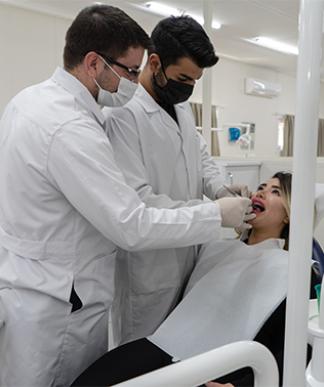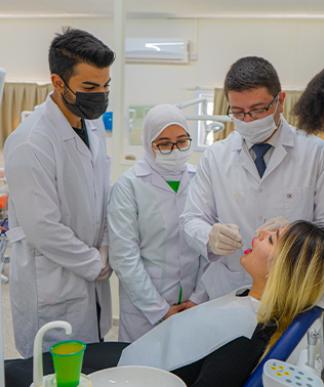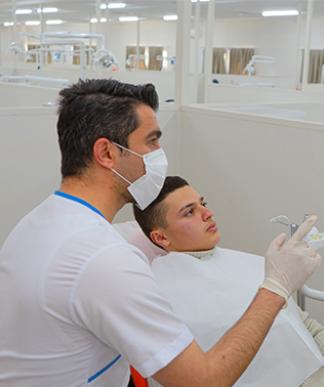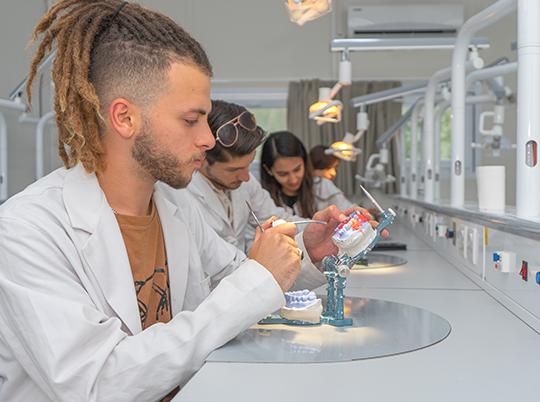


About the Program
The doctoral program of the Department of Prosthodontics offered by the Institute of Graduate Studies and Research at Cyprus International University aims to train professional dentists who can make patient diagnoses and treatment plans using the most up-to-date information and technologies. Prosthodontics trains dentists who receive doctoral education to be able to do research, question, have the analytical and critical thinking, follow the innovations in their field, and have clinical and scientific equipment.
Education Opportunities
In addition to basic dental sciences, the program covers many science fields such as substance knowledge, chewing systematics, kinesiology, gnat logical principles, aesthetic dentistry, and prosthetic applications.

Career Areas
Graduates of the Prosthodontics doctorate program can carry out clinical and academic studies in various institutions and organizations with the title of "Doctor of Science". They can also work in research and practice centers or by opening their own clinics or practices.
Contact
Institute of Graduate Studies and Research
Graduate Sciences and Education Center, GE106
Tel: +90 392 671 1111 Extension: 2776
Institute E-mail: ciu-institute@ciu.edu.tr
Compulsory Courses
First Semester
FIXED PARTIAL DENTURES-I
Course code
PRDT601Credit
4Theoretical
2Practical
4Ects
6REMOVABLE DENTURES
Course code
PRDT603Credit
4Theoretical
2Practical
4Ects
6MASTICATORY SYSTEM, TMJ AND DENTAL OCCLUSION
Course code
PRDT605Credit
3Theoretical
2Practical
2Ects
4CLINICAL APPLICATIONS-I
Course code
PRDT701Credit
0Theoretical
0Practical
0Ects
10PROSTHETIC TREATMENT PLANNING AND COMMUNICATION
Course code
PRDT703Credit
3Theoretical
3Practical
0Ects
4Second Semester
FIXED PARTIAL DENTURES-II
Course code
PRDT602Credit
4Theoretical
4Practical
2Ects
6ADVANCED PROSTHETIC RESTORATIVE SYSTEMS
Course code
PRDT604Credit
4Theoretical
2Practical
4Ects
6IMPLANT SUPPORTED DENTURES AND PRINCIPLES OF BIOMECHANICS
Course code
PRDT606Credit
3Theoretical
2Practical
2Ects
4CLINICAL APPLICATIONS-II
Course code
PRDT702Credit
0Theoretical
0Practical
0Ects
10DENTAL MATERIALS
Course code
PRDT704Credit
3Theoretical
3Practical
0Ects
4Third Semester
CURRENT APPROACHES IN AESTHETIC DENTISTRY
Course code
PRDT607Credit
4Theoretical
2Practical
4Ects
6PROSTHETIC APPLICATIONS IN DIGITAL DENTISTRY
Course code
PRDT609Credit
4Theoretical
2Practical
4Ects
6SEMINAR
Course code
PRDT611Credit
0Theoretical
0Practical
0Ects
5CLINICAL APPLICATIONS-III
Course code
PRDT617Credit
0Theoretical
0Practical
0Ects
10CLINICAL RESEARCH TECHNIQUES AND ETHICS
Course code
PRDT705Credit
3Theoretical
2Practical
0Ects
3Fourth Semester
DOCTORAL PROFICIENCY
Course code
PRDT608Credit
0Theoretical
0Practical
0Ects
20CLINICAL APPLICATIONS-IV
Course code
PRDT706Credit
0Theoretical
0Practical
0Ects
10Fifth Semester
THESIS STUDY
Course code
PRDT610Credit
0Theoretical
0Practical
0Ects
120CLINICAL STUDY IN DOCTORAL FIELD-I
Course code
PRDT612Credit
0Theoretical
0Practical
0Ects
0Sixth Semester
CLINICAL STUDY IN DOCTORAL FIELD-II
Course code
PRDT613Credit
0Theoretical
0Practical
0Ects
0Seventh Semester
CLINICAL STUDY IN DOCTORAL FIELD-III
Course code
PRDT614Credit
0Theoretical
0Practical
0Ects
0Eighth Semester
CLINICAL STUDY IN DOCTORAL FIELD-IV
Course code
PRDT615Credit
0Theoretical
0Practical
0Ects
0Elective Courses
Entry Requirements
- The prospective student agrees that she/he shall apply to YÖK or YÖDAK for the equivalency of their undergraduate diplomas.
- The prospective student agrees that she/he shall apply to the Association of Turkish Cypriot Doctors in order to become a temporary member.
- The prospective international student agrees that she/he shall provide a Turkish Language Certificate or shall attend the Turkish Proficiency Test or shall study for a year for Turkish language education in order to continue their clinical studies. During their Turkish language study, students shall take one PhD course per semester for their PhD in Dentistry program.
- Prospective students agree that she/he shall provide an English Language Certificate (IELTS 6.0) or shall attend the English Proficiency Test which is organized by the School of Modern Languages. According to their success, students shall continue to the first year of the program or shall study the English language.
- Prospective students agree that she/he shall accept to work at least 20 hours per week during their PhD study and this clinical duty shall continue for 46 weeks per year.
- Prospective students agree that she/he shall accept buying clinical dentistry units with a written commitment.
- Surgery prospective students agree that she/he shall accept to comply with a two-semester (9 months) rotation duty in a full-fledged hospital.
- If necessary, Prospective students agree that she/he shall attend an online interview about the basic dental knowledge of the relevant field.
- Prospective students agree that she/he shall comply with clinical working programs with a written commitment.
- Prospective students agree that she/he shall comply with a written commitment to obeying professional and ethical responsibilities and not to cause malpractice conditions.
Cyprus International University provides academic scholarships for its students as an incentive for success, with most students benefiting from 50%, 75% or 100% scholarships or discounted tuition fees. Click for more information.
Click for more to learn about fees in line with the Tuition Fee Calculation system.
| Fee per course | € 1.250,00 |
| Fee for thesis (per semester) | € 625,00 |
| Fee for seminar | € 200,00 |
| Scientific Foundation per course | € 150,00 |
| Annual Registration Fee | € 295,00 |
| VAT Exc. |